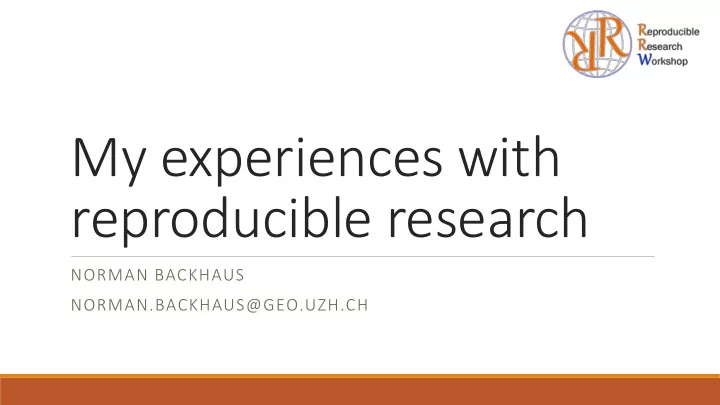

My experiences with reproducible research NORMAN BACKHAUS NORMAN.BACKHAUS@GEO.UZH.CH
Defining reproducibility • Technically not really possible since every data collection is unique to a certain extent • Data collection that is geared towards comparing the results with previous research • Data collection is only reproducible if enough parameters of the previous research are known • In social scientific research reproducibility does not seek to reproduce the exact same result but to compare different situations with the same methodological approach 2 INNOPOOL WORKSHOP REPRODUCIBLE RESEARCH: SESSION 1
Failure and success with reproducibility • Example of long term monitoring in the Swiss National Park - Early pioneers did remarkable research and went to great lengths to make it reproducible - But still there are many uncertainties as to the exact locations and methods they used - Or, places and methods are known, but not deemed adequate for contemporary research - Such things often only show after a long time • Social scientific research: example of value generation in the Swiss National Park region - 1998 by Irene Küpfer, 2012 repetition (see below) - Both failure and success 3 INNOPOOL WORKSHOP REPRODUCIBLE RESEARCH: SESSION 1
Efforts to make our research reproducible • In general with social scientific research - Making methodological approach as clear as possible - Not only provide questionnaire or interview guidelines but also critically assess what went well and what not • With qualitative research - State the researchers’ positionality because it can influence the way responses are given - State the special context in which the data collection is embedded - Potentially remark what kind of reproduction would be interesting in the future 4 INNOPOOL WORKSHOP REPRODUCIBLE RESEARCH: SESSION 1
Which aspects are not reproducible? • Both with quantitative and qualitative research - People change and cannot be questioned the same way - With panel surveys people (probably) remember the earlier questions - Positionality can be stated but almost not reproduced (even if it is the same person that conducts interviews) • With qualitative research - In most cases i nterview transcripts should not be handed over to other persons (data protection) - Hence, even with the same data reproducibility is difficult if not possible 5 INNOPOOL WORKSHOP REPRODUCIBLE RESEARCH: SESSION 1
Reproducing others‘ research • We reproduced Küpfer‘s 1998 study on value generation in the Swiss National Park and also Knaus ‘ 2011 study on the same topic in the Biosphere reserve Entlebuch • Both authors gave us good information about their methods in their writings (and orally) • Nevertheless an exact replication was not possible - Küpfer did not provide the exact locations where she collected data - For resource reasons we could not adapt the same kind of data collection - We had less people but more time - We asked for people‘s expenditures from the past day rather than from the last week - We had different notions about what is a NP visitor and what not - Knaus ‘ questionnaire could be used well, however the context was different 6 INNOPOOL WORKSHOP REPRODUCIBLE RESEARCH: SESSION 1
Measures to make research reproducible • Transparency regarding context, positionality and questions asked - Not always possible in journals - Clean up data sheets from quantitative surveys (excel, SPSS) - Find a place to store these data sheets (still uncommon to attach them to papers) • Bear in mind the limits imposed through data protection - Anonymity and people’s right to their own data - Be careful about which kind of data can be stored • State what would be interesting to be reproduced and what not 7 INNOPOOL WORKSHOP REPRODUCIBLE RESEARCH: SESSION 1
Recommend
More recommend